Andrew Johnson Worksheets
Do you want to save dozens of hours in time? Get your evenings and weekends back? Be able to teach about Andrew Johnson to your students?
Our worksheet bundle includes a fact file and printable worksheets and student activities. Perfect for both the classroom and homeschooling!
Resource Examples
Click any of the example images below to view a larger version.
Fact File
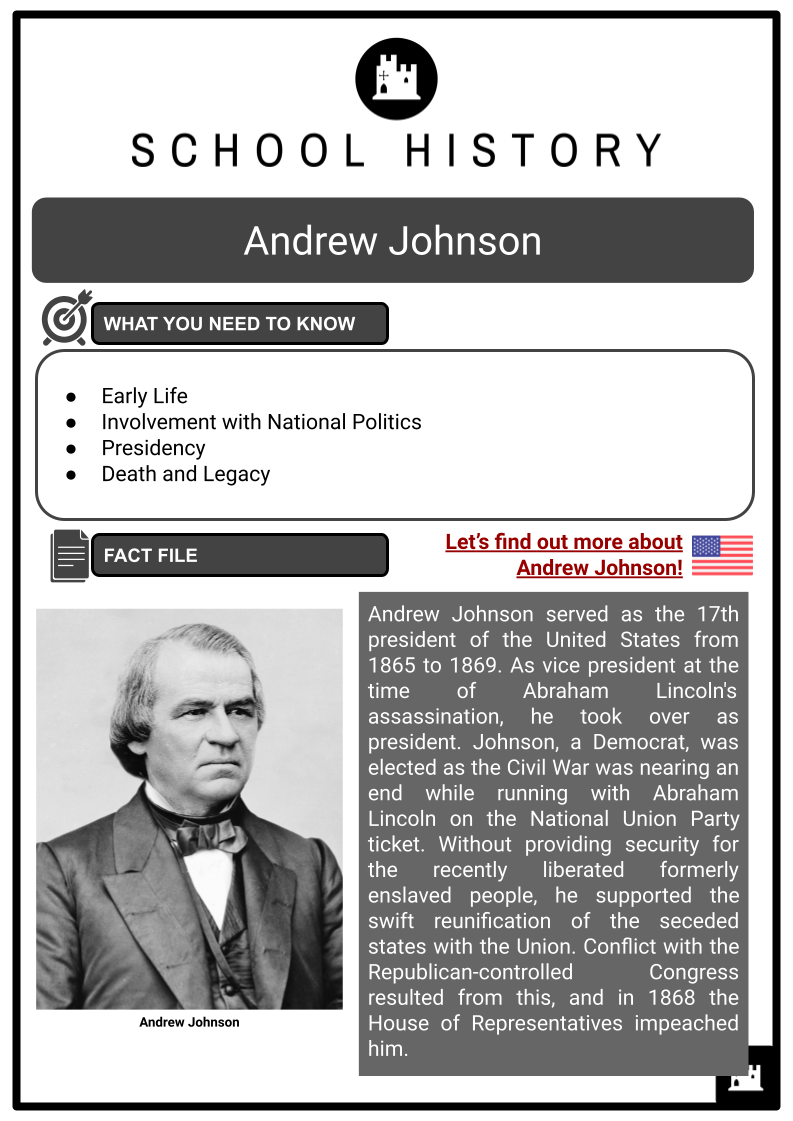
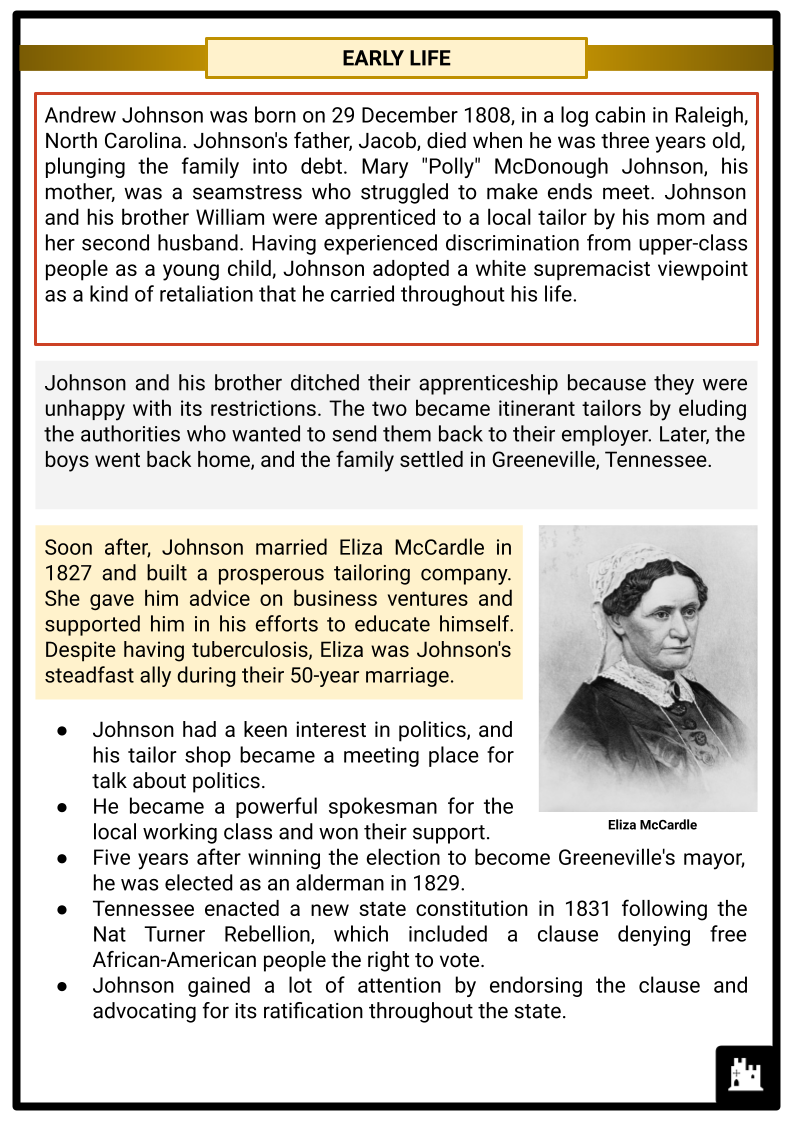
Student Activities
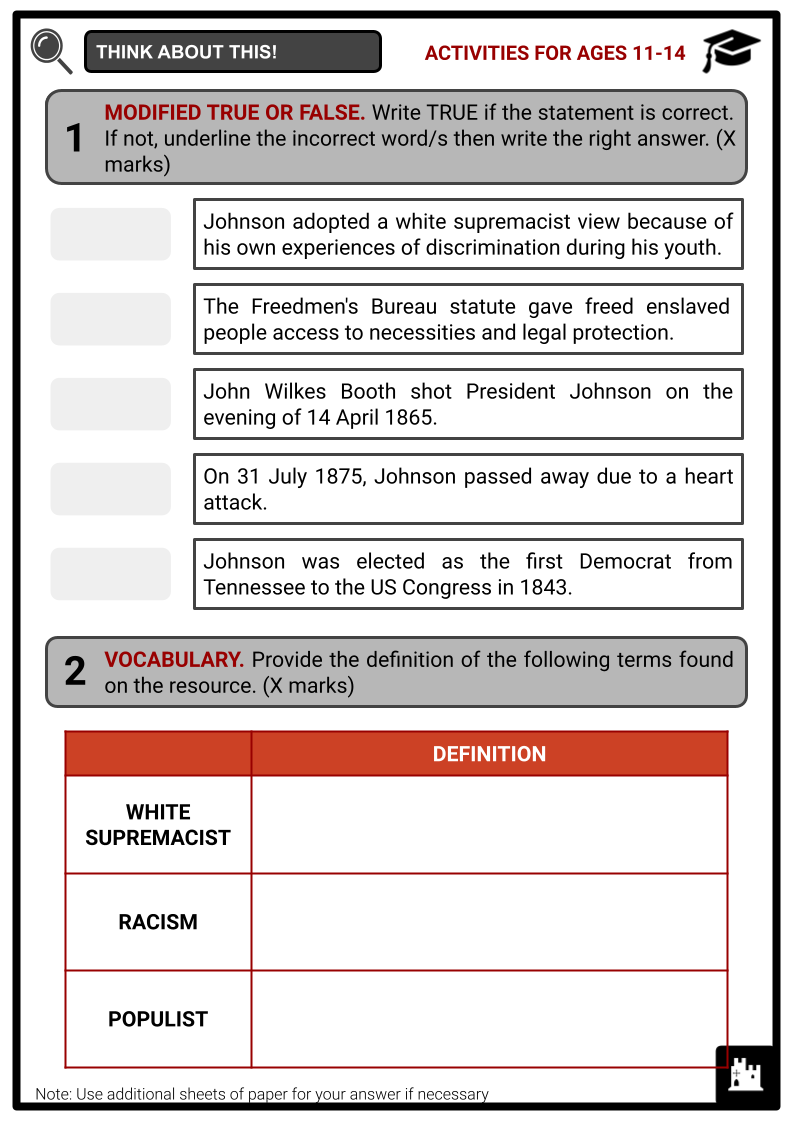
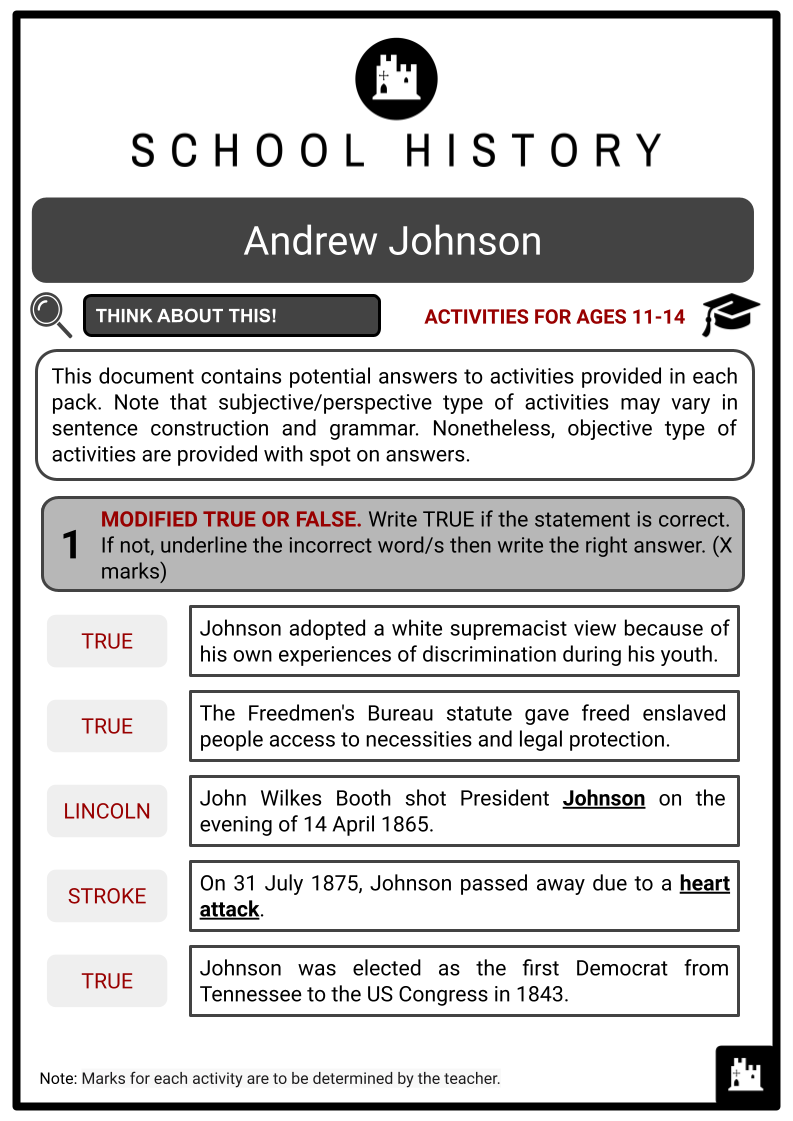
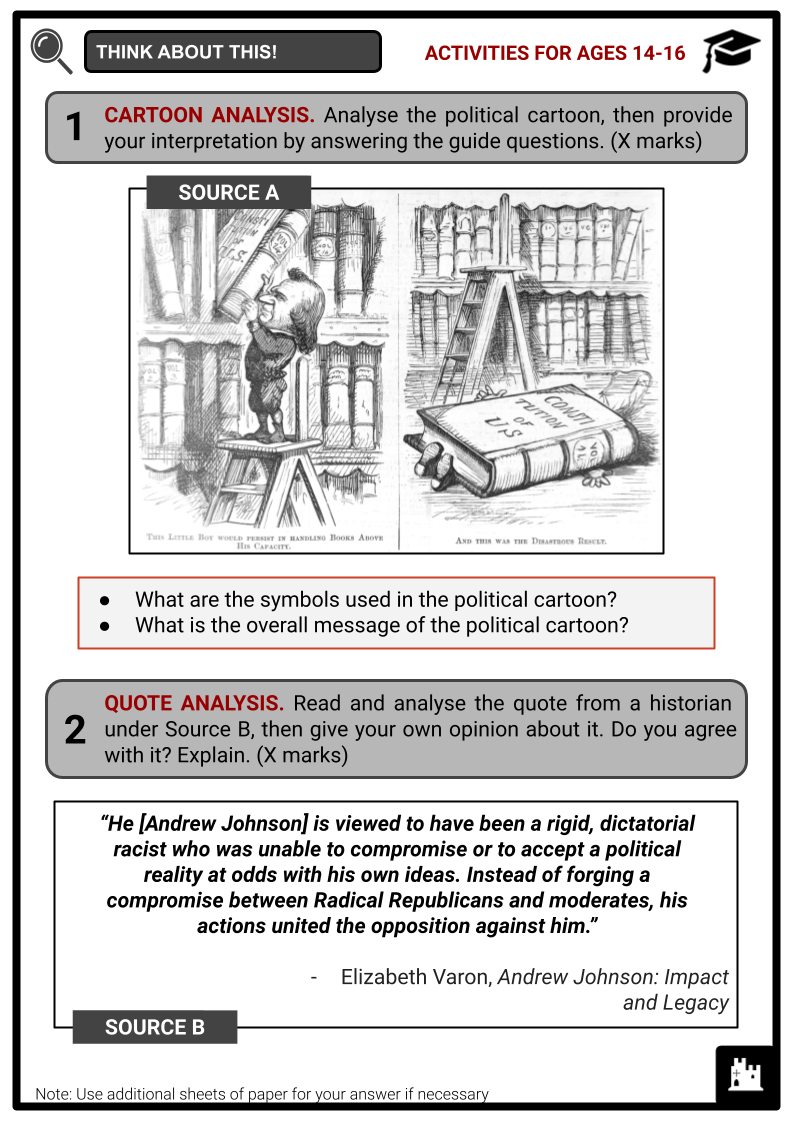
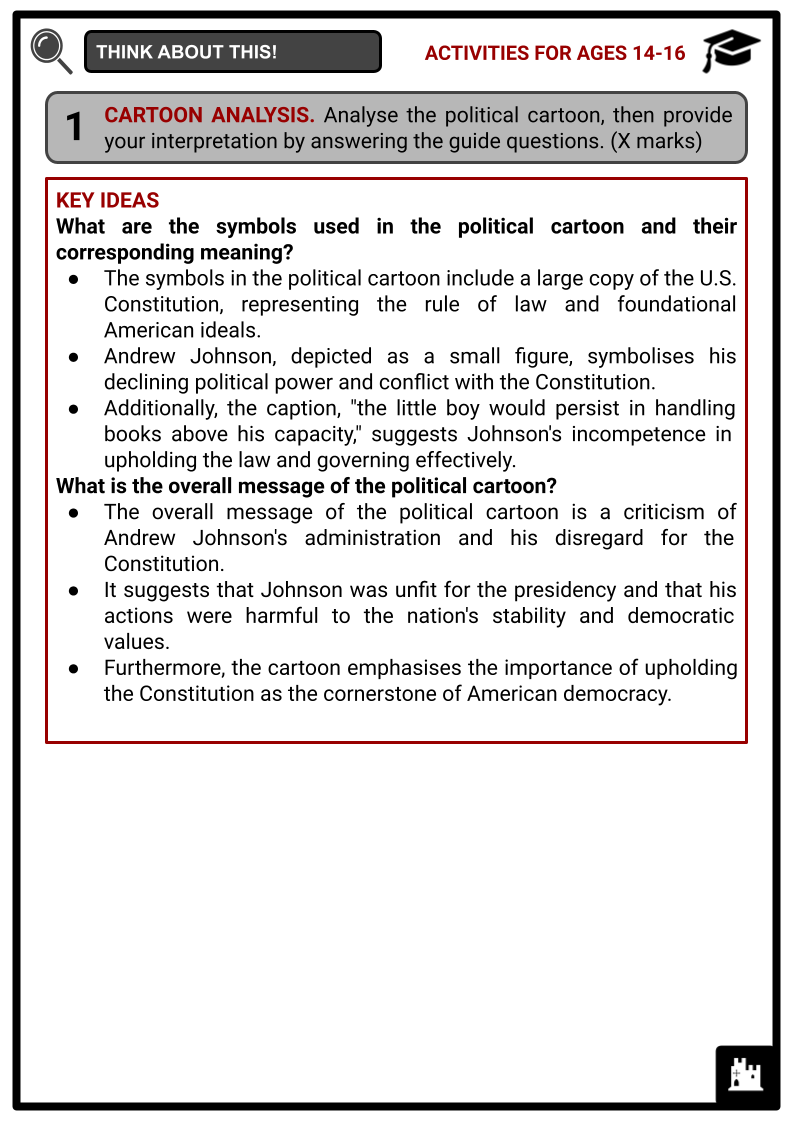
Summary
- Early Life
- Involvement with National Politics
- Presidency
- Death and Legacy
Key Facts And Information
Let’s find out more about Andrew Johnson!
Andrew Johnson served as the 17th president of the United States from 1865 to 1869. As vice president at the time of Abraham Lincoln's assassination, he took over as president. Johnson, a Democrat, was elected as the Civil War was nearing an end while running with Abraham Lincoln on the National Union Party ticket. Without providing security for the recently liberated formerly enslaved people, he supported the swift reunification of the seceded states with the Union. Conflict with the Republican-controlled Congress resulted from this, and in 1868, the House of Representatives impeached him.
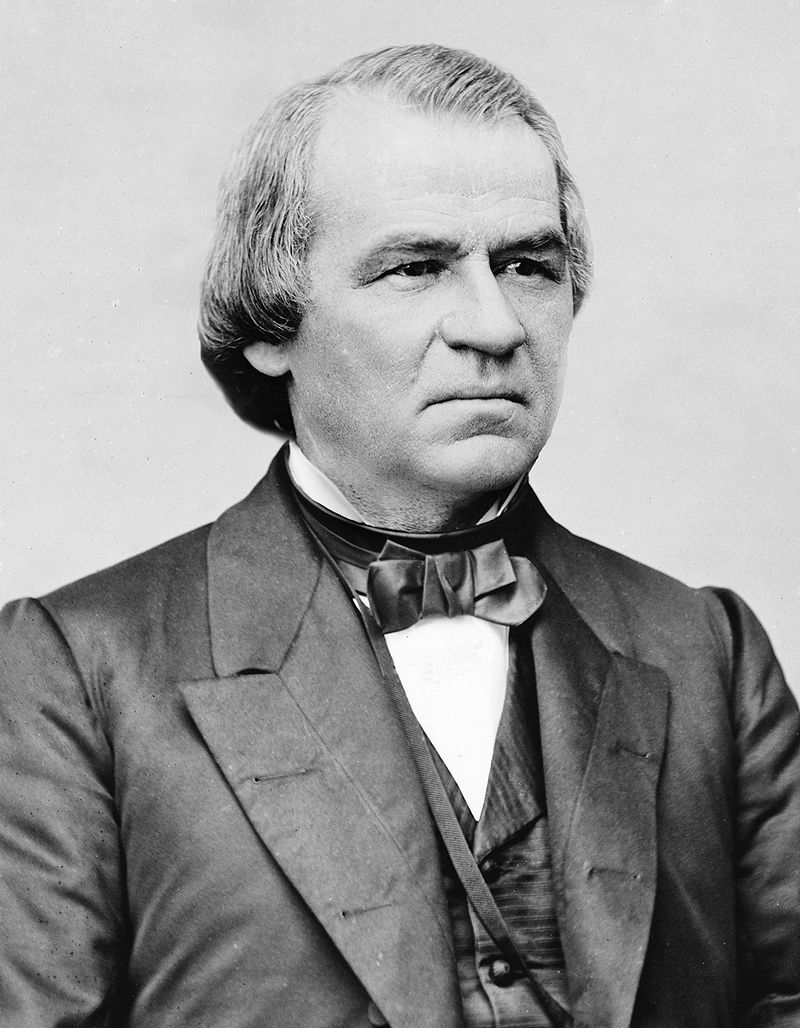
EARLY LIFE
- Andrew Johnson was born on 29 December 1808, in a log cabin in Raleigh, North Carolina. Johnson's father, Jacob, died when he was three years old, plunging the family into debt. Mary "Polly" McDonough Johnson, his mother, was a seamstress who struggled to make ends meet. Johnson and his brother William were apprenticed to a local tailor by his mom and her second husband. Having experienced discrimination from upper-class people as a young child, Johnson adopted a white supremacist viewpoint as a kind of retaliation that he carried throughout his life.
- Andrew Johnson was born on 29 December 1808, in a log cabin in Raleigh, North Carolina. Johnson's father, Jacob, died when he was three years old, plunging the family into debt. Mary "Polly" McDonough Johnson, his mother, was a seamstress who struggled to make ends meet. Johnson and his brother William were apprenticed to a local tailor by his mom and her second husband. Having experienced discrimination from upper-class people as a young child, Johnson adopted a white supremacist viewpoint as a kind of retaliation that he carried throughout his life.
- Johnson and his brother ditched their apprenticeship because they were unhappy with its restrictions. The two became itinerant tailors by eluding the authorities who wanted to send them back to their employer. Later, the boys went back home, and the family settled in Greeneville, Tennessee.
- Soon after, Johnson married Eliza McCardle in 1827 and built a prosperous tailoring company. She gave him advice on business ventures and supported him in his efforts to educate himself. Despite having tuberculosis, Eliza was Johnson's steadfast ally during their 50-year marriage.
- Johnson had a keen interest in politics, and his tailor shop became a meeting place for talk about politics.
- He became a powerful spokesman for the local working class and won their support.
- Five years after winning the election to become Greeneville's mayor, he was elected as an alderman in 1829.
- Tennessee enacted a new state constitution in 1831 following the Nat Turner Rebellion, which included a clause denying free African-American people the right to vote.
- Johnson gained a lot of attention by endorsing the clause and advocating for its ratification throughout the state.
- Johnson was elected to the Tennessee state assembly in 1835. He aligned with Andrew Jackson's Democratic ideas, supporting the underprivileged and opposing wasteful government expenditure. Not only was he a fervent opponent of abolition, but he also championed state sovereignty and the Union without reservation.
INVOLVEMENT WITH NATIONAL POLITICS
- Johnson was elected as the first Democrat from Tennessee to the US Congress in 1843. He said that slavery was necessary for the maintenance of the Union and joined a newly formed Democratic majority in the House of Representatives. This was a little different from what his fellow Southerners were saying, who were starting to talk of splitting up if slavery was outlawed. The Whig party was growing in Tennessee during Johnson's fifth and last term in Congress, and he realised that his chances of winning a sixth term were limited.
- Johnson was elected to serve as Tennessee's governor in 1853. He attempted to advance his fiscally conservative, populist beliefs throughout his two terms in office, but he found the process discouraging because the governor's constitutional powers were restricted to making recommendations to the legislature—he had no veto authority. By assigning significant positions to political supporters, he maximised the use of his position.
- Johnson thought about running for president as the 1856 election drew closer, but he didn't think he had the necessary level of national exposure. Instead, he decided to run for office in the US. Senate. Despite his party's dominance in the legislature, the campaign proved challenging.
- His populist ideas were not well received by many Democratic leaders. Nevertheless, the legislature of Tennessee did elect him, and the opposition press responded sharply and quickly. Johnson was described by the Richmond Whig as "the most unscrupulous and vilest radical demagogue in the Union."
- Johnson supported the Homestead Act as a congressman and proposed it as a senator.
- Many Southern Democrats fiercely opposed the law, fearing that impoverished ‘Whites’ and immigrants who couldn't afford or didn't want slavery in the area would inhabit the property.
- President Buchanan vetoed an extensively revised law that had been passed.
- Johnson maintained his independent path for the balance of his Senate tenure, publicly expressing his support for the Union and opposing abolition.
- Following the election of Abraham Lincoln in 1860, Tennessee withdrew from the Union. Johnson became the first senator from the South to keep his position in the Senate after breaking with his home state. Senate. It was the South that demonised him. His wife and two daughters were forced to leave Tennessee, and his property was seized. The Lincoln Administration did not, however, ignore his fervour for the Union.
- Johnson was named military governor by Lincoln in 1862, following the occupation of Tennessee by Union forces. He treads carefully, extending an olive branch to his fellow Tennesseans while threatening rebels with the full weight of the federal government. Because rebels under the command of Confederate General Nathan Bedford Forrest often invaded cities and towns, he was never able to seize total control of the state.
- Johnson first disagreed with the Emancipation Proclamation, but he eventually came around to it once Tennessee was granted an exception and he saw how crucial it was to bringing an end to the war. His shifts were exposed by Southern newspapers, who also charged him with running for office. This notion played out when Lincoln, worried about his odds for reelection, selected Johnson as his vice president to help balance his campaign in 1864. Lincoln won a resounding victory for reelection in the summer and autumn of 1864, following a string of notable Union triumphs.
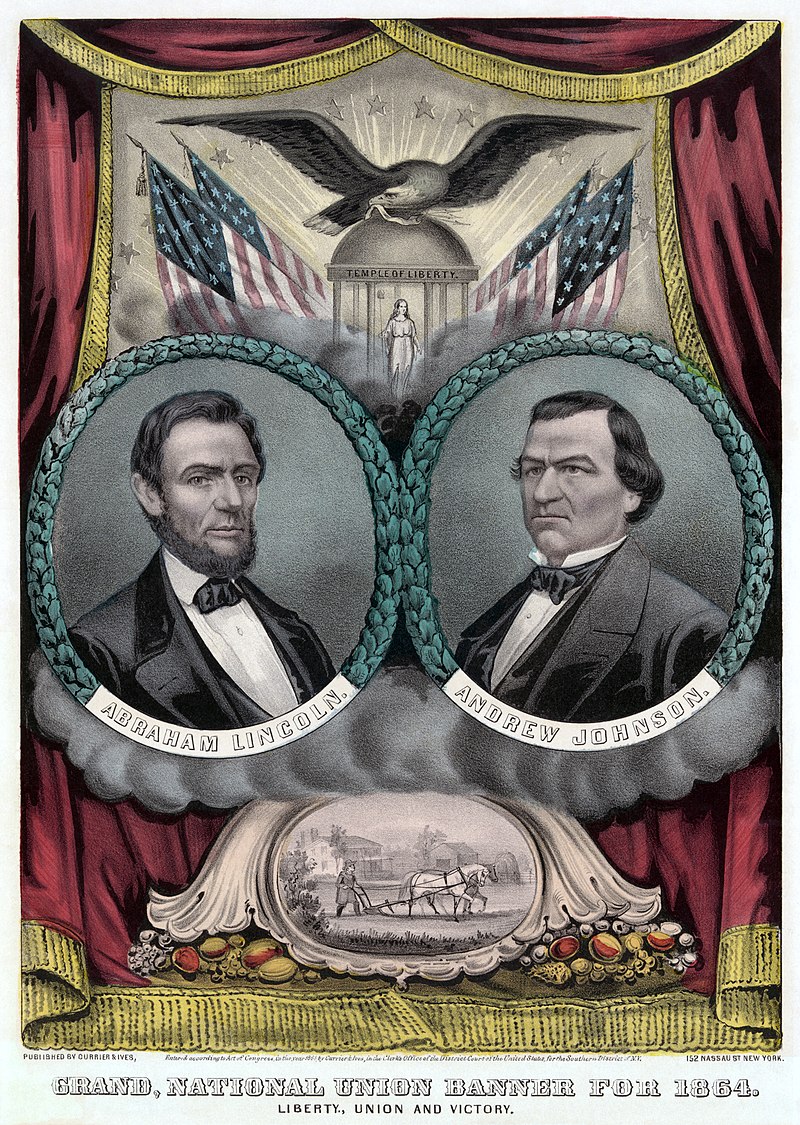
PRESIDENCY
- John Wilkes Booth shot President Lincoln on the evening of 14 April 1865, as he was having a night out at Ford's Theatre in Washington, D.C. Lincoln passed away the next morning. On that tragic night, Johnson was also a target, but his would-be killer never showed up. Johnson took the oath of office as the 17th president of the United States, three hours after Lincoln passed away. In a bizarre irony common to American history, Johnson, a bigot from the South, was tasked with restoring the South and granting formerly enslaved African-American people the opportunity to vote and civil rights.
- During the first eight months of Johnson's presidency, Congress was in break, and he made the most of this opportunity to push through his own Reconstruction programmes. He promptly offered amnesty and pardons to any rebels who would swear loyalty. As a result, a large number of former Confederates were elected to government in Southern states, where they established "Black codes," which effectively upheld slavery. Subsequently, he extended his pardons to the highest-ranking Confederate leaders, such as Alexander Stephens, Jefferson Davis's vice president.
- Members of Congress were furious with the president's disregard for African-American civil rights when they returned.
- The Freedmen's Bureau Act, established by Congress in 1866, gave freed enslaved people access to necessities and legal protection for their rights.
- Then, they approved the Civil Rights Act which states "all persons born in the United States and not subject to any foreign power, excluding Indians not taxed."
- Johnson vetoed these two bills because he thought that the states, not the federal government, should be in charge of determining suffrage legislation and that Southern states were underrepresented in Congress. Congress overruled the two vetoes.
- Less than a month after Congress adopted the 14th Amendment in June and sent it to the states for ratification, it was ratified. Congress also approved the Tenure of Office Act, which denied the president the authority to dismiss federal officials without the Senate's assent—a unique interpretation of the Constitution's "advise and consent" provision. Congress initiated military Reconstruction in the former Confederate states in 1867 to guarantee African-American Southerners' political and social rights.
- In retaliation, President Johnson made several public appearances during the 1866 congressional elections, making direct appeals to the people. Johnson seems to have overindulged in alcohol on several occasions, which caused him to polarise his audiences rather than win them over. The public's support for Johnson declined even further as a result of the disastrous campaign. The midterm elections were a resounding triumph for the Radical Republicans.
- Johnson sensed that his presidency was collapsing under him.
- He believed that his only option was to challenge the Tenure of Office Act as a clear breach of his constitutional power since he had lost the backing of Congress and the general public.
- He dismissed Secretary of War Edwin Stanton in August 1867 after many run-ins with the man.
- The Tenure of Office Act was broken, and President Johnson was accused of embarrassing and mocking Congress, therefore the House decided to impeach him in February 1868.
- In the Senate trial, he was found not guilty by just a single vote. Although he was still president, his efficacy and reputation were completely wiped out.
DEATH AND LEGACY
- Johnson's resistance to Reconstruction and his self-imposed status as the ‘white’ race's defender persisted until the end of his administration. He made use of his exceptional oratory abilities and entered the lecture circuit after leaving the White House. He was elected to the U.S. Senate one more time in 1874. He objected to President Ulysses S. Grant's military action in Louisiana in his first address back in the Senate.
- Convinced that some of his rivals in the Ohio governor race were discrediting him, he made the decision to go to Ohio to deliver speeches around the end of July 1875. Starting on July 28, he stopped at his daughter Mary's property near Elizabethton, where his daughter Martha was also staying, to break up the travel. He suffered a stroke that evening, but he refused to receive medical attention until the next day.
- When he did not get better, two Elizabethton-based physicians were called in. Although he appeared to be responding to their care, he suffered another stroke on the evening of 30 July and passed away early the next morning of 31 July at the age of 66.
- In Greeneville, Johnson's funeral was held on August 3. In accordance with his desires, he was buried with his body covered in an American flag and a copy of the US Constitution beneath his head. Along with his house and tailor business, the burial area was designated as the Andrew Johnson National Cemetery in 1906 and is now a part of the Andrew Johnson National Historic Site.
- According to some historians, Johnson was the weakest candidate for president at the close of the Civil War. He was unable to achieve a satisfactory peace because of his racial beliefs. His conceit cost him the public's support, and his lack of political skill caused him to become estranged from Congress. As president, he missed the chance to stand up for the rights of the underprivileged and most likely contributed to the national unrest that ensued after the Civil War.
Frequently Asked Questions
- Who was Andrew Johnson?
Andrew Johnson was the 17th President of the United States, serving from 1865 to 1869.
- How did Andrew Johnson become president?
Andrew Johnson became president after the assassination of President Abraham Lincoln on 15 April 1865. He was Lincoln's vice president at the time.
- What were Andrew Johnson's views on Reconstruction?
Johnson's Reconstruction policies were lenient towards the South. He favoured quick restoration of the Southern states to the Union with minimal federal intervention, often putting him at odds with the Radical Republicans in Congress.
